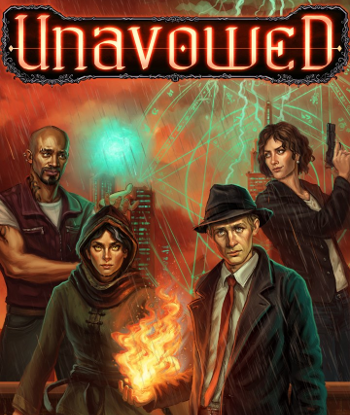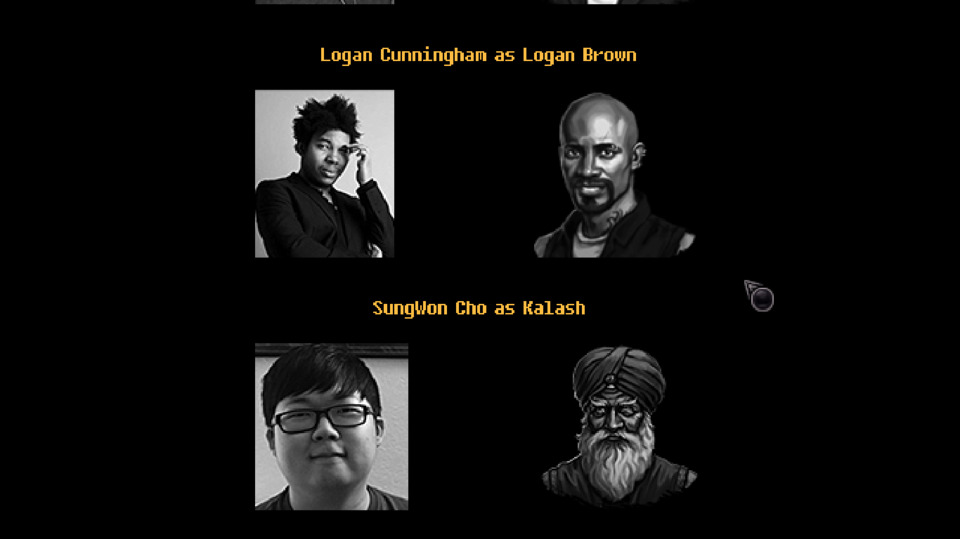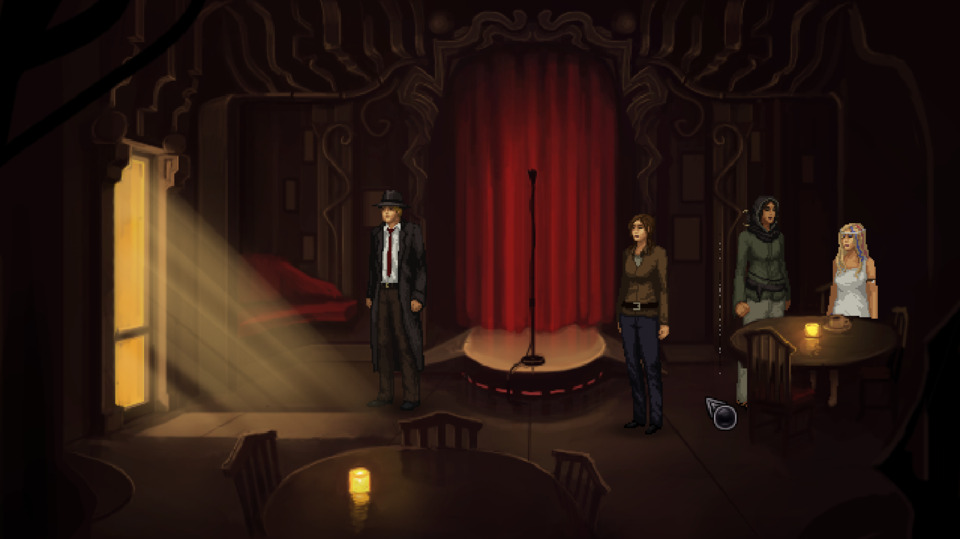Indie Game of the Week 226: Unavowed
By Mento 3 Comments

I've used this organ of mine (I mean... the blog, this one) many times to talk about how adventure gaming has blossomed into this many branched thing thanks to the inventive storytellers in the Indie development tier, embracing many new and different approaches to designing a narrative-heavy game. Even with this veritable smorgasbord, I always find myself most drawn to the point and click genre: the one that I grew up with, the one that feels the most natural fit for a story-directed game give or take an inventory puzzle that makes no sense in retrospect, and one of the few genres that actually collapsed under its own innovations once upon a time (well, that and an unnecessary fixation on live-action FMV). Each generation of the point and click genre was defined by a single developer that contemporaries followed behind: originally it was ICOM with their MacVentures series, then Sierra with King's/Space/Police Quest and their many non-Questing franchises, then LucasArts with their comedy-infused movie pastiches. My belief is that this now retro genre belongs almost entirely to Wadjet Eye and the creative forces they've gathered under their publishing umbrella, and for that reason each new game to come from that collective is invariably worth a look-see. Their 2018 game Unavowed, developed by Wadjet Eye directly, is definitely no exception.
Based, if only spiritually, on The Dresden Files novella series by Jim Butcher, The Unavowed is a secretive organization of the magically-inclined and the "void-touched" - those who have had a brush with the supernatural and can no longer separate what lies behind the veil with their previous mundane realities - who act as the last bastion between malignant magical forces and the oblivious human populace. The protagonist, a player-named character of either gender and three possible origin stories (similar to the main character of a BioWare game, in fact; and the similarities don't end there either), finds themselves drawn to this world after being possessed by a demonic entity, causing them to go on a year-long rampage of murder and duplicity across the city. The Unavowed track you down, or your possessed form at least, and manage to separate you from your eldritch hijacker; wanted for murder and filled with questions, you join them in trying to figure out what the demon's next plan might be and fixing the carnage it's left in its wake.

A major aspect of the game's puzzle design and storytelling alike involves the other members of the Unavowed - two originally, a well-preserved fire mage named Eli who is the spitting image of a Dashiell Hammett gumshoe, and an immortal half-jinn warrior named Mandana, with two others recruited during the story - each with their own areas of expertise and advice to share. Each mission requires you take two along, and the game has a Deus Ex-style multiple-solution approach to puzzle solving dependent on who you have with you. Sometimes it's not just relying on their supernatural talents; Mandana, for instance, is physically formidable with her cutlass and able to cut down foes and barriers (like a locked door) alike with ease, but she's also part jinn and therefore sensitive to falsehoods and deception - a skill that comes in useful when interrogating chronic liars. As intimated, the game has a certain episodic mission structure (another BioWare similarity) where you get called out to resolve some supernatural matter - invariably caused by your one-time lodger - and each is designed to be passable with any combination of Unavowed members you bring with you; the game actually won't let you reorganize your party until after the mission is complete, not just to keep each of these vignettes tidily isolated but to assuage fears that you brought the "wrong" people with you.
This structure also highlights something I've liked from previous Wadjet Eye games and modern adventure games in general: a certain compartmentalization that minimizes excess inventory management or an overabundance of active hotspots. Because any one "mission" rarely comprises more than a handful of screens or NPCs to talk to, the inventory puzzles are rarely so involved that you're likely to get stymied for long. The game does put forward a few thinkers here and there - there's some passwords to glean and codes to break - but the dearth of too many moving parts ensures a minimal amount of fuss and frustration. It's also helped that the puzzle design doesn't have the moon logic issues of some of its older kin, though I imagine that's the result of more thorough playtesting. (My guess is that the designers hit ctrl-F to search for the phrase "how the fuck was I supposed to" in every subsequent version's QA report until it stopped appearing.)

I also found the storytelling and characterization to be uniformly excellent, to the extent that I'm considering another playthrough to try some of the missions with different team dynamics. Both Eli and Mandana have been around so long and seen so many things that not only are they a font of knowledge on the history of New York - the game's singular setting - but they've also accrued a lot of emotional baggage in that time that you can help with by hearing them out between story missions. Likewise, the two recruits - though as new to the "job" as you are - have their own skills and troubled pasts that help define them as flawed and fully-realized people. The game has a gentle sense of humor to balance the more serious stuff, so the story never feels too heavy or too light, and boy does it go some places (and not just via the subway either). I suspect if you're a fan of The Dresden Files or other media like it - the Buffy the Vampire Slayer spin-off Angel definitely came to mind once or twice, despite being set on the opposite coast - there'll be a lot for you to enjoy here. I know there was for me.
Rating: 5 out of 5.
| < Back to 225: Blasphemous | The First 100 | The Second 100 | > Forward to 227: Tiny Dangerous Dungeons |
